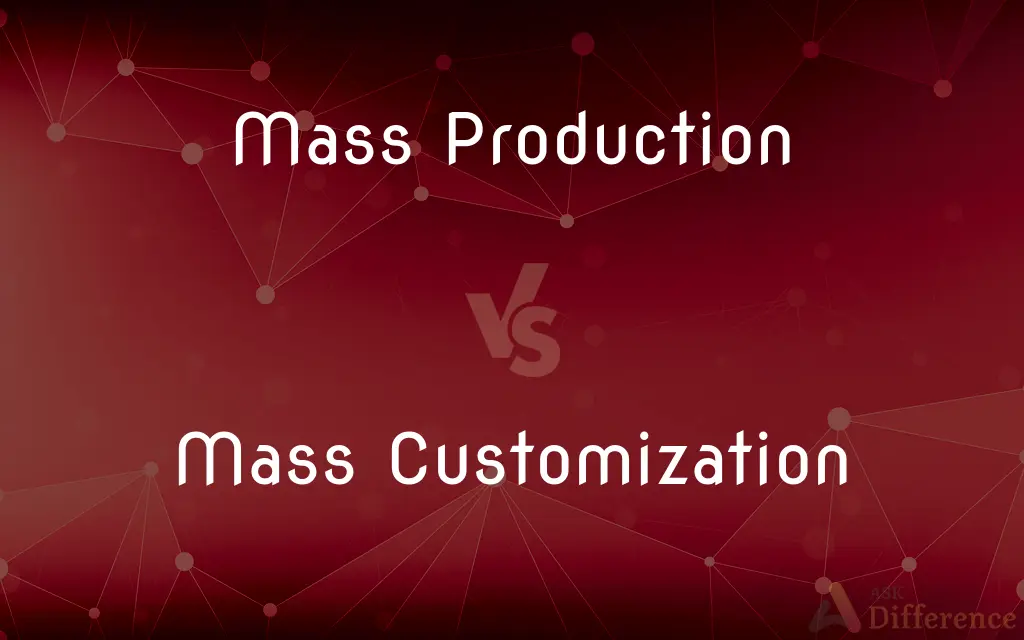Mass Production vs. Mass Customization — What's the Difference?
By Tayyaba Rehman & Fiza Rafique — Published on October 22, 2023
Mass production is the manufacturing of large quantities of identical products, while mass customization produces large quantities tailored to individual preferences.

Difference Between Mass Production and Mass Customization
Table of Contents
ADVERTISEMENT
Key Differences
Mass production and mass customization are both approaches to manufacturing, yet they cater to different market demands. Mass production involves creating vast numbers of the same product with no variations, optimized for efficiency and scale. By producing identical items in large batches, economies of scale are achieved, often leading to lower per-unit costs. This system has been a cornerstone of industrial manufacturing since the early 20th century.
On the contrary, mass customization is a response to the consumer desire for personalized products. This approach manufactures goods in large quantities but allows for individual customizations based on specific customer needs. Thus, while it maintains some benefits of scale, mass customization adapts to provide a degree of personalization.
While mass production can result in a surplus of products that might not meet specific market needs, mass customization can align more closely with consumer desires. It’s a balance between the efficiency of mass production and the uniqueness of bespoke items.
In a world where consumers are increasingly seeking unique and tailored experiences, mass customization offers a solution. Yet, it's worth noting that this method can sometimes come at a higher cost due to the complexities of managing individual customizations. Conversely, mass production's strength lies in its ability to produce goods at a lower cost, though at the expense of personalization.
Comparison Chart
Primary Focus
Efficiency and scale.
Individual customization at scale.
ADVERTISEMENT
Cost Implication
Lower per-unit costs due to economies of scale.
Potentially higher costs due to individual customizations.
Consumer Personalization
None; products are identical.
High; products are tailored to individual preferences.
Flexibility
Low; changes can disrupt the process.
Higher; designed to adapt to individual requirements.
Market Alignment
General market needs.
Specific consumer desires.
Compare with Definitions
Mass Production
Products from mass production lack individual customization.
Every gadget from that company's mass production line looks the same.
Mass Customization
Mass customization tailors products for individual needs on a large scale.
With mass customization, each customer could choose the color and features of their laptop.
Mass Production
Mass production is creating large quantities of identical items.
The automobile industry revolutionized with the advent of mass production techniques.
Mass Customization
The process allows for individual adjustments within a framework.
Thanks to mass customization, the software caters to both general and niche markets.
Mass Production
It emphasizes efficiency and scale.
Mass production lowered the cost of consumer goods in the 20th century.
Mass Customization
Offers a balance between efficiency and uniqueness.
The furniture store adopted mass customization to offer both unique designs and affordability.
Mass Production
Economies of scale are a primary advantage.
The toy factory benefits from economies of scale due to its mass production capabilities.
Mass Customization
It merges large-scale manufacturing with personalization.
Sneaker brands often use mass customization to cater to diverse customer preferences.
Mass Production
The process is streamlined for uniformity.
Through mass production, the company can produce thousands of shoes daily.
Mass Customization
Consumers play an active role in the product's final design.
Through mass customization, buyers can influence the design elements of their jewelry.
Common Curiosities
How does mass customization cater to modern consumer demands?
Mass customization addresses the desire for personalized products tailored to individual preferences while maintaining scale.
Is mass customization a modern concept?
While the idea has roots in earlier times, advances in technology have made mass customization more feasible in recent decades.
Can a company implement both mass production and mass customization?
Yes, some companies employ mass production for certain products and mass customization for others based on market needs.
Is mass customization more expensive than mass production?
Often, due to the complexities of individual customizations, mass customization can be more costly per unit than mass production.
How do companies manage the complexities of mass customization?
Advanced technologies, modular product designs, and flexible manufacturing systems enable effective mass customization.
Which industries commonly use mass production?
Industries like automobiles, electronics, and consumer goods often rely on mass production.
Does mass production always lead to cheaper products?
Generally, due to economies of scale, mass production can lead to lower per-unit costs, but not always cheaper retail prices.
Can mass customization work for services, or is it just for products?
Mass customization can be applied to services as well, tailoring services to individual client needs while maintaining efficiency.
Are there any downsides to mass customization?
Challenges include managing production complexities, potential higher costs, and ensuring timely delivery with varied products.
What drove the rise of mass production?
The need for efficiency, scale, and the ability to produce affordable products for a broad market led to the rise of mass production.
Does mass production mean lower quality?
Not necessarily. While mass production focuses on scale and efficiency, it doesn't inherently compromise quality.
How do consumers participate in mass customization?
Consumers might choose specific features, designs, or other custom elements when ordering a product, influencing its final form.
Can all products be subject to mass customization?
While many can, not all products are suitable. The feasibility depends on the product's nature and the company's capability.
How has technology impacted mass customization?
Technologies like 3D printing, advanced software, and automation have significantly enhanced the feasibility of mass customization.
Why was mass production revolutionary in the industrial age?
It allowed for rapid production of goods at reduced costs, making products more accessible to a wider audience.
Share Your Discovery

Previous Comparison
Clubbiness vs. Palliness
Next Comparison
Microsoft Office vs. Open OfficeAuthor Spotlight
Written by
Tayyaba RehmanTayyaba Rehman is a distinguished writer, currently serving as a primary contributor to askdifference.com. As a researcher in semantics and etymology, Tayyaba's passion for the complexity of languages and their distinctions has found a perfect home on the platform. Tayyaba delves into the intricacies of language, distinguishing between commonly confused words and phrases, thereby providing clarity for readers worldwide.
Co-written by
Fiza RafiqueFiza Rafique is a skilled content writer at AskDifference.com, where she meticulously refines and enhances written pieces. Drawing from her vast editorial expertise, Fiza ensures clarity, accuracy, and precision in every article. Passionate about language, she continually seeks to elevate the quality of content for readers worldwide.
















































